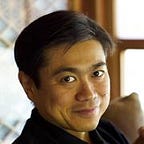What I’ve learned from JJ Abrams
Thanks for the endorsement JJ!
I met JJ in 2007 at a retreat/event that I was helping to organize. Since then he’s become an important inspiration in my life and we have shared some really wonderful moments. He embodies a lot of the principles and ideas in Whiplash.
A year after I started as the director of the MIT Media Lab, JJ visited the Lab and did a Conversation Series talk with me.
In the conversation, we talked about the creative process and how he makes movies and TV shows. He talked a lot about what in Whiplash would fall under the Compasses over Maps principle. The interesting thing about what JJ had to say was that not only does he allow the map to change, the compass might even change. He describes serendipity and the importance of peripheral vision in discovery — something key to science. Here’s an excerpt from the conversation:
And that’s how a TV shows works. When we were doing the pilot for “Lost,” Damon, Carlton, and I had a lot of big ideas about where we thought the show would go. But the truth is, we never could have nor should we have plotted the whole thing out. When Damon and Carlton cast Michael Emerson as Ben Linus, he was a one-episode character. And he showed up and Michael is a brilliant actor and did his work as he does, brilliantly. Damon and Carlton realized this guy is a far more important character than I thought. And they continued to use him — now if we are just stuck to a plan, he would’ve come and gone in one episode and the show would’ve continued. But the truth is you have to know as you are working on anything — Felicity or Alias or Fringe— “we have the big idea.” I always liken it to driving in the fog where you see where you’re going, where there is an outline of this place where you are going. That’s my destination, it’s the best I’ve got at the time and you start to go there. Now as you are heading towards that destination and you are going through the fog, suddenly you realize that there is this giant canyon you have to go around. The thing you thought was going to be solid ground, isn’t. The character that you thought would be great, the relationship, the person you cast, the actor, that love affair you thought would be just the hottest, greatest thing, is a fucking disaster. The thing that you thought was never going to be anything is suddenly Ben Linus and then you go, Dear Lord that’s a whole other place. If you’re not open to the best idea, whether it’s a scene for a movie, an episode or a story arc for a series, you’re closed to the possibilities and that’s what I think is exciting about working on film and TV. It’s that it is organic. It is this evolving thing. And to look at it like a job or a project that is delineated by the expectations, to me limits the possibilities. Some of the great inventions were not intended.
I asked JJ to be an advisor to the Media Lab, but he said he wanted to work with us and do stuff, not just advise, so he joined the freshly minted Director’s Fellows Program that I created with Reid Hoffman and has been a great creative asset to the Media Lab ever since.
In 2015, I brought a bunch of people working on synthetic biology to Bad Robot and we spent the day with Katie and other people from his team brainstorming about what the future might look like. It was exciting for all of us to imagine that maybe some of our crazy ideas might some day end up in a TV series or a movie. It was also really interesting to watch JJ and his team try to extract the stories from our descriptions of technology.
A few months ago, Joe Derisi and Reid Hoffman organized a Genomics Boot Camp at UCSF and JJ and I spent the day actually planning and using CRISPR/Cas9 (something we cover in Whiplash) to make edits in DNA. This was something that just a few years ago at Bad Robot, we had just discussed as a “coming soon” future. It was interesting how much deeper our understanding was after actually doing it than just talking about it. We all walked away with new creative juices added to our brains. (Thanks Joe and Reid!)
In a world so intent on “solving problems,” JJ plays a tremendously important role in helping us also imagine and explore the future.
